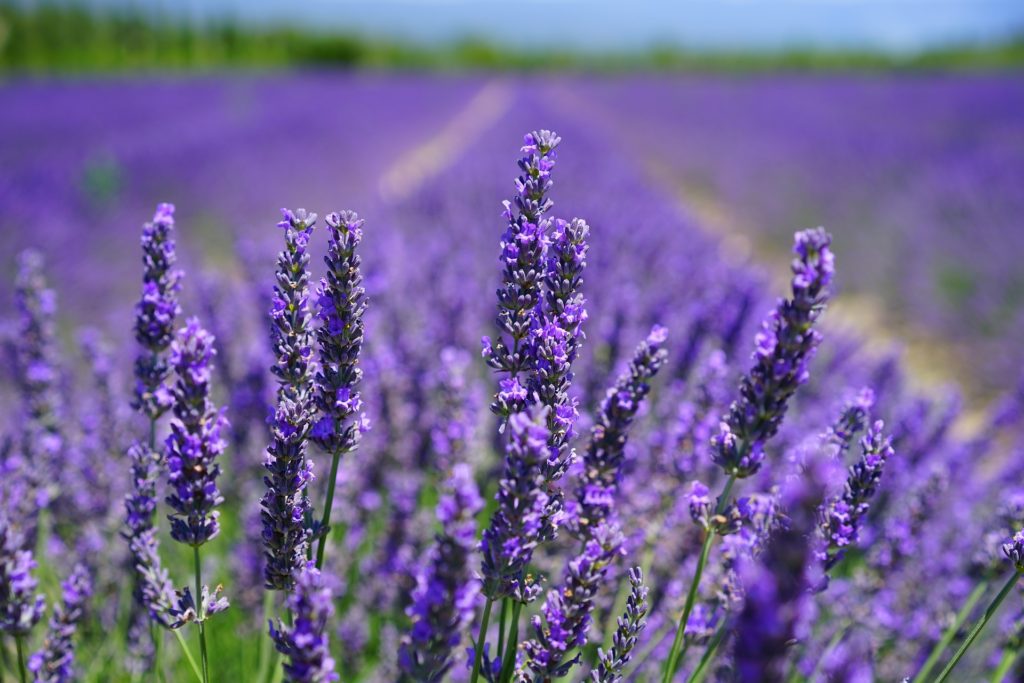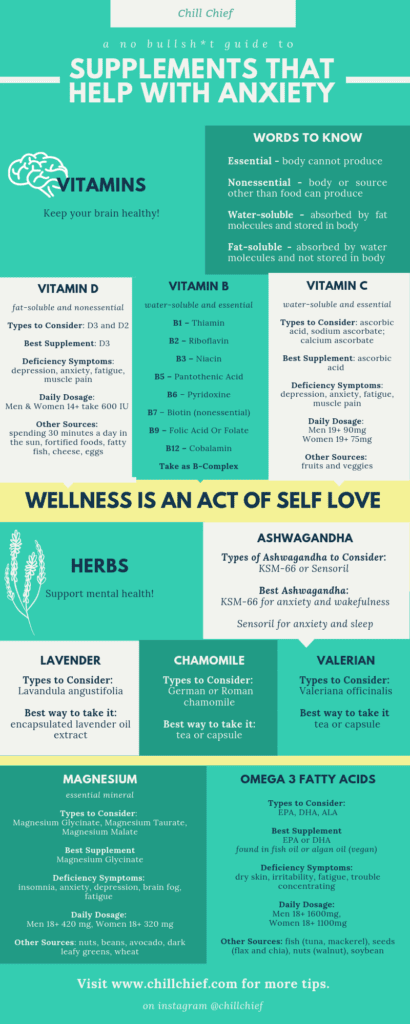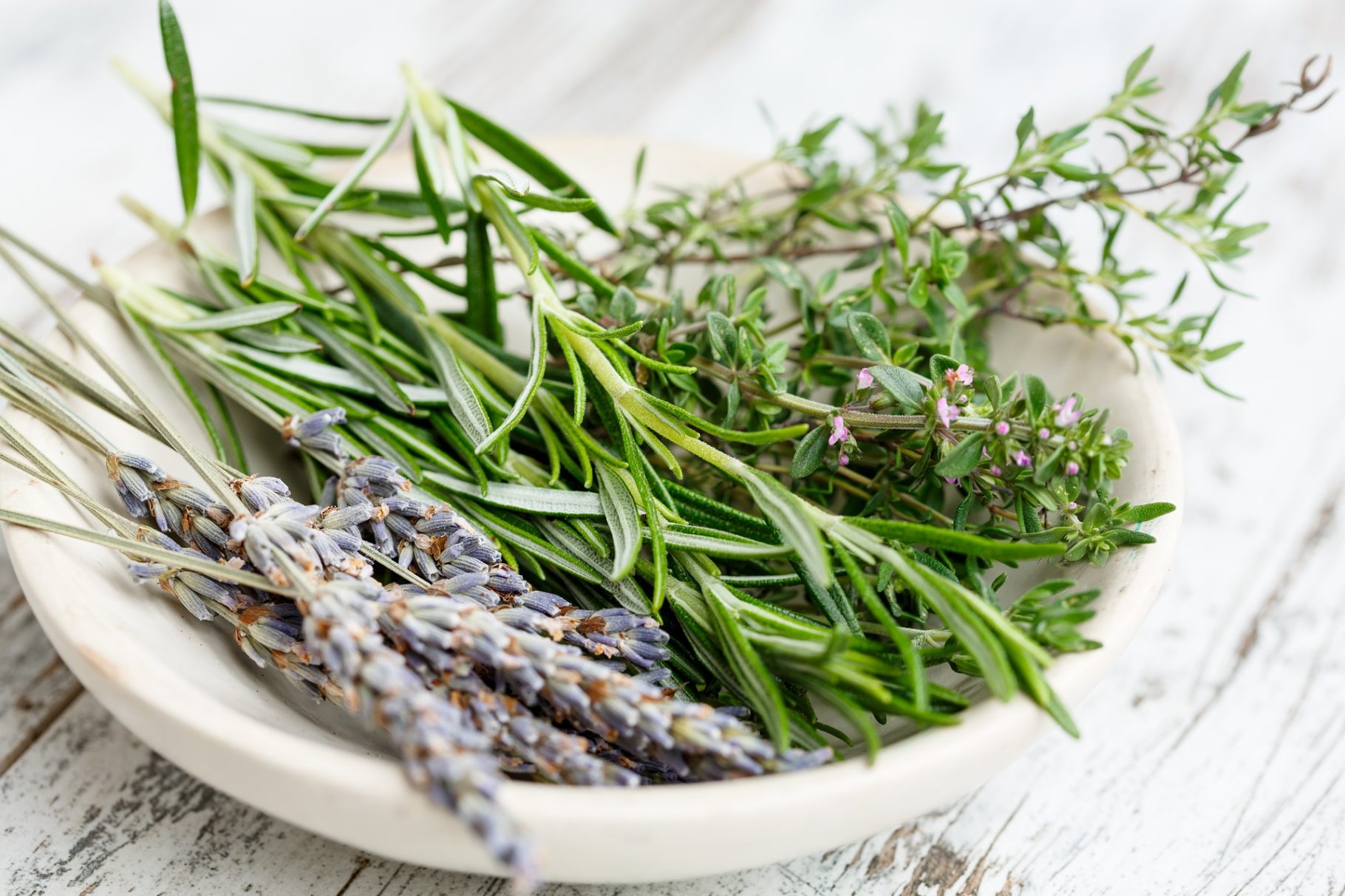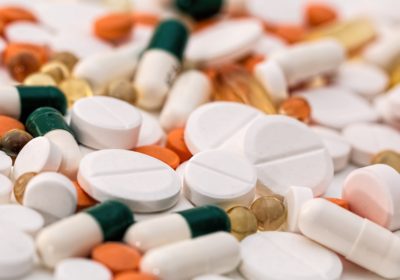Supplements that Help with Anxiety
Anxiety is the world’s most common mental health illness, affecting over 40 million people in the US alone. (1) Science shows that creating a balanced internal ecosystem helps support mental health. While supplements that help with anxiety are only one piece of the puzzle, they can lower symptoms of anxiety by assisting in overall health.
Modern research supports the claim that a variety of vitamin, mineral, herbal, and probiotic supplements can aid in relieving symptoms of anxiety.
Supplements, in the form of vitamins and minerals, can be a great option to get nutrients that are lacking in your diet. Herbal supplements may help promote positive outcomes or inhibit the adverse side effects of anxiety.
“Even in healthy humans, multivitamin supplementation has been shown to improve cognitive performance and reduce negative mood states, including depression, anxiety, and stress,” explains one study on B vitamins effect on brain and body function. (3)
The top vitamin, mineral, and herbal supplements that help with anxiety are outlined here so you can determine what may be the right fit for you.
Always talk to your doctor before adding any supplements to your routine. This is not healthcare advice rather information regarding studies and personal experience.
Vitamins, Minerals and Amino Acids for Anxiety
Vitamin and mineral inefficiencies and deficiencies negatively impact how well our brain functions. Deficiencies are seen all around the world, even in the US. A whopping 41.6% of the US adult population lives with a vitamin D deficiency.
Vitamins, minerals, and amino acids play a vital role in brain function, emotional regulation, neural connections, focus, and anxiety levels.
Lifestyle, diet, and genetics contribute to overall nutrients levels in the body. The most common and impactful nutritional supplements that help with anxiety are listed below, in no particular order.
Terms to know:
- Fat-soluble: absorbed by fat molecules and stored in tissues
- Water-soluble: absorbed by water and are not stored in tissues or body
- Essential: nutrients that the body cannot make or produce in sufficient quantities, aka we need to get it from somewhere outside the body
- Nonessential: nutrients can be made by the body or obtained from sources other than foods and beverages
Magnesium
Magnesium is a mineral that is critical to the sodium-potassium pump, which regulates the nervous system. Two anxiety regulating chemicals in the body – serotonin and GABA – are heavily impacted by magnesium levels.
According to the National Institute of Health, most Americans don’t get enough magnesium from their diet due to refined foods. (9) Around 70% of Americans have a lower intake of magnesium than the daily recommended value. (9)
Magnesium Stats
- Types of Magnesium to Consider: Magnesium Glycinate, Magnesium Taurate, Magnesium Malate
- Best Magnesium for Anxiety: Magnesium Glycinate
- Symptoms of Magnesium Deficiency: insomnia, anxiety, depression, brain fog, fatigue
- Daily Dosage: Men 18+ 420 mg, Women 18+ 320 mg
- Other Sources: nuts, beans, avocado, dark leafy greens, wheat
Vitamin D
fat-soluble and nonessential
Vitamin D is more strongly linked with depression than anxiety, although low levels of vitamin D have been associated with anxiety. (7)
There are two types of vitamin D – D2 and D3. D2 comes mostly from plants and fortified foods. D3 is produced in the skin when it is exposed to the sun; therefore, it also comes from animal food sources. (2)
Vitamin D3 takes the cake when it comes to positive output and effect in the body. D3 vitamin supplements hold up better to degradation and have higher production of helpful body chemicals. (2)
Spending 30 minutes a day outside in the sun also helps produce D3 naturally in the skin.
Vitamin D Stats
- Types of Vitamin D to Consider: D3 and D2
- Best Vitamin D of Anxiety: D3 Supplements
- Symptoms of Vitamin D Deficiency: Depression, anxiety, fatigue, muscle pain
- Daily Dosage: Men and Women 14+ take 600 IU
- Other Sources: spending 30 minutes a day in the sun, fortified foods, fatty fish, cheese, eggs
Vitamin B
water-soluble and essential
B vitamins, particularly B1 thiamin, are beneficial in treating anxiety. (6)
There are 8 specific B-vitamins referred to as the B-complex. Collectively, b-complex vitamins are fundamental to many aspects of brain function. Insufficient levels of vitamin B are associated with inflammation and oxidative stress – which can be disruptive and damaging to mental health. (3)
- Vitamin B1 – Thiamin
- Vitamin B2 – Riboflavin
- Vitamin B3 – Niacin
- Vitamin B5 – Pantothenic Acid
- Vitamin B6 – Pyridoxine
- Vitamin B7 – Biotin (nonessential)
- Vitamin B9 – Folic Acid Or Folate
- Vitamin B12 – Cobalamin
B12 is almost solely derived from animal products like dairy, eggs, meat, and fish. (4) Supplementation of B12 is vital for vegans or strict vegetarians. B-vitamins can be taken as a complex or in a multivitamin.
Vitamin B Stats
- Types of Vitamin B to Consider: All
- Best Vitamin B for Anxiety: B-complex vitamin
- Symptoms of Vitamin B Deficiency: each b vitamin has different symptoms of deficiency
- Daily Dosage: check out the dosage chart for all B vitamin recommended daily value
- Other Sources: whole grains, meat, legumes, nuts, avocado
Vitamin C
water-soluble and essential
Also known as ascorbic acid, vitamin C has been shown to reduce anxiety levels and regulate mood states. (8)
Vitamin C is needed in the body to grow and repair cells. (4) It reduces brain-damaging oxidative stress and therefore is titled an antioxidant. Supplements may not provide the same antioxidant effects as vitamin C found naturally in food.
Vitamin C is essential in the production of numerous brain messengers called neurotransmitters. (5)
Vitamin C Stats
- Types of Vitamin C to Consider: ascorbic acid, sodium ascorbate; calcium ascorbate
- Best Vitamin C: ascorbic acid
- Daily Dosage: Men 19+ 90mg, Women 19+ 75mg
- Other Sources: fruits (citrus, kiwi, strawberry) and vegetables (tomato, potato, cabbage)
Omega 3 Fatty Acids
Omega 3 fatty acids and their metabolites have been suggested to reduce depression, lower anxiety, act as an anti-inflammatory and improve cognitive function.
The brain is made up of 60% fat. EPA and DHA are the two most studied omega 3 fatty acids. These two acids are commonly found in marine oils, whereas ALA is found in plant oils. EPA shows beneficial effects for mood disorders, while DHA is more aligned with neurodegenerative diseases. (10)
Omega 3 Fatty Acid Stats
- Types of Omega 3 to Consider: EPA, DHA, ALA
- Best Omega 3: EPA or DHA found in fish oil or algan oil (vegan)
- Symptoms of Omega 3 Deficiency: dry skin, irritability, fatigue, trouble concentrating
- Daily Dosage: Men 18+ 1600mg, Women 18+ 1100mg
- Other Sources: fish (tuna, mackerel), seeds (flax and chia), nuts (walnut), soybean

Herbal Supplements for Anxiety
Herbs are a supportive tool for managing anxiety. Adaptogenic herbs are often used to treat symptoms of anxiety. The term adaptogen refers to an herb’s ability to lessen the damaging effects of stress and restore normal functioning.
Tonic herbs focus on increasing wellbeing rather than focusing on reducing sickness. Herbs considered to be a tonic help rebuild and refresh the mind and body.
Most herbs can be purchased in the form of dried herb, tea, powder, capsules, liquid extract, and tinctures. Generally, liquid extracts provide the most value because they preserve volatile compounds within the plants.
Ashwagandha
Ashwagandha is an adaptogenic herb suggested to lower anxiety, decrease cortisol, reduce stress perception, and increase neuron growth. To learn more about the benefits, this article is a good place to start.
Withanolides are the active ingredient in ashwagandha that is responsible for many brain-boosting benefits. Studies recommend using a product with 5% withanolides to act as a tonic. (11) Both Sensoril and KSM-66 ashwagandha have a standardized above 5% withanolides.
If you are looking for a quality product this ashwagandha supplement guide will help you find a credible brand.
Ashwagandha Stats
- Types of Ashwagandha to Consider: KSM-66 or Sensoril
- Best Ashwagandha: KSM-66 for anxiety relief and wakefulness, Sensoril for anxiety relief and sleep
Valerian Root
Valerian root can help induce sleep, improve sleep quality, lower anxiety, and alleviate psychological and physical stress.
Valeric acid is an active ingredient that has been shown to regulate serotonin in the brain. (3) Serotonin is often targeted and studied for its effects on anxiety and depression.
Valerian officials is the primary type of herb studied from the 250 types of valerian. In the US, valerian is often sold for sleep disorders. In Europe, valerian is mainly used to treat anxiety
Valerian Root Stats
- Types of Valerian to Consider: Valeriana officinalis
- Best way to take Valerian Root: tea or capsule
Lavender
Lavender has been studied to lower anxiety, increase mood, relax brain wave activity, and increase positive social interactions. (12)
European Medicines Agency (EMA) approved lavender as an herbal medicine for anxiety and stress. The primary lavender strain studied for its effectiveness in treating anxiety is Lavandula angustifolia, formerly known as Lavandula officinalis or English Lavender.
Lavender Stats
- Types of Lavender to Consider: Lavandula angustifolia
- Best way to take Lavender: encapsulated lavender oil extract
Chamomile
Chamomile is suggested to induce sleep, improve sleep quality, reduce anxiety, lower depressive symptoms, and promote digestive health.
Chamomile is both an anti-inflammatory and antioxidant, both of which are supportive in managing mental health. Herbalists recommend taking chamomile for 3 months to 1 year to experience the full benefits of the herb. (12)
Chamomile Stats
- Types of Chamomile to Consider: German chamomile or Roman chamomile
- Best way to take Chamomile: tea or capsule




